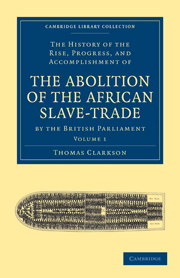Book contents
Summary
The next class of the forerunners and coadjutors, up to the year 1787, will consist, first, of the Quakers in America; and then of others, as they were united to these for the same object.
It may be asked, How the Quakers living there should have become forerunners and coadjutors in the great work now under our consideration. I reply, first, That it was an object for many years with these to do away the Slave-trade as it was carried on in their own ports. But this trade was conducted in part, both before and after the independence of America, by our own countrymen. It was, secondly, an object with these to annihilate slavery in America; and this they have been instruments in accomplishing to a considerable extent. But any abolition of slavery within given boundaries must be a blow to the Slave-trade there. The American Quakers, lastly, living in a land where both the commerce and slavery existed, were in the way of obtaining a number of important facts relative to both, which made for their annihilation; and communicating many of these facts to those in England, who espoused the same cause, they became fellow-labourers with these in producing the event in question.
The Quakers in America, it must be owned, did most of them originally as other settlers there with respect to the purchase of slaves. They had lands without a sufficient number of labourers, and families without a sufficient number of servants, for their work.
- Type
- Chapter
- Information
- The History of the Rise, Progress, and Accomplishment of the Abolition of the African Slave-Trade by the British Parliament , pp. 131 - 192Publisher: Cambridge University PressPrint publication year: 2010First published in: 1808



